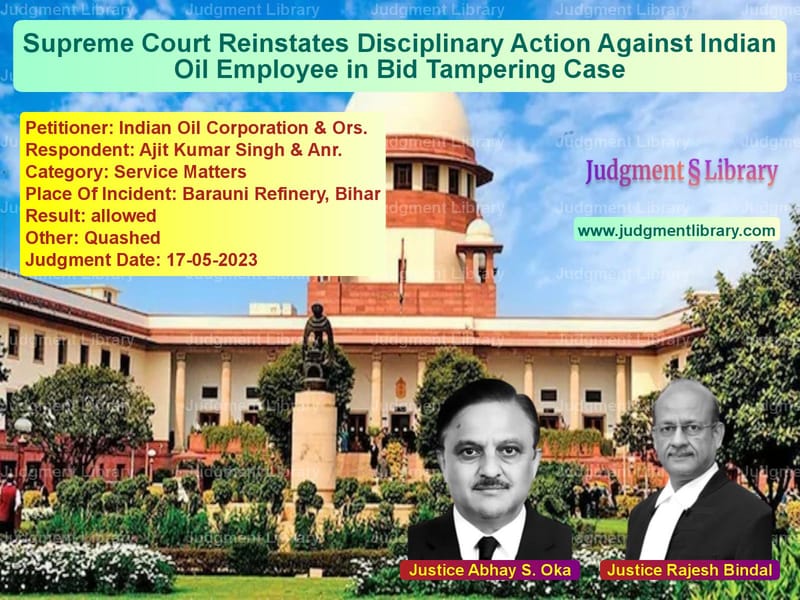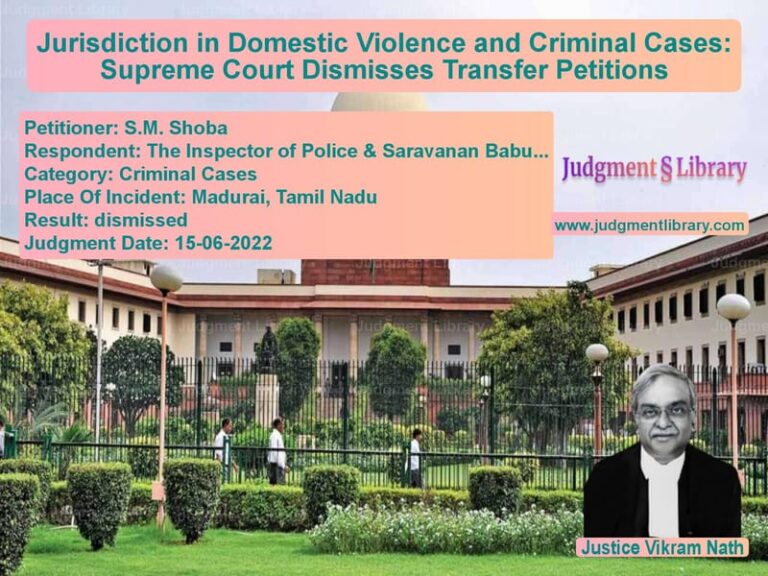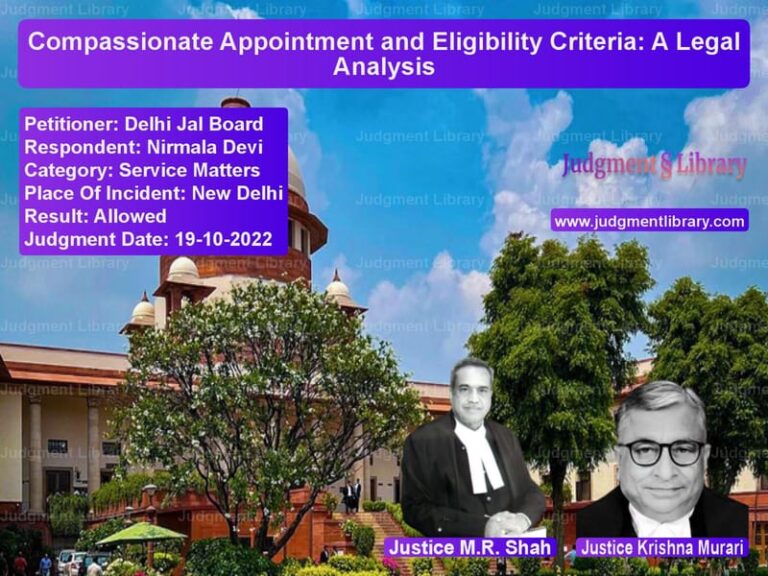Supreme Court Reinstates Disciplinary Action Against Indian Oil Employee in Bid Tampering Case
The Supreme Court of India, in the case of Indian Oil Corporation & Ors. vs. Ajit Kumar Singh & Anr., ruled in favor of Indian Oil Corporation (IOC) by reinstating the disciplinary action taken against an employee found guilty of bid tampering. The Court overturned the Patna High Court’s Division Bench ruling, which had set aside the punishment imposed on the employee. The decision reinforces the principle that judicial review in disciplinary matters should not amount to reappreciation of evidence like an appellate forum.
Background of the Case
The case arose from allegations of bid tampering in a tender process at the Barauni Refinery. On June 30, 2001, IOC issued a tender for ‘Repair of Surface Drain and Tank Pad and Tank No. 235, 236, and 237’ inside the refinery. The technical bids were opened on August 24, 2001, but price bids were kept unopened in a locked drawer. The price bids were eventually opened on October 1, 2001. However, discrepancies were later discovered in the bid submitted by one of the contractors, M/s. B.S. Jha, which had been altered to make it the lowest bid (L-1).
Subsequent investigation revealed that the price bid had been tampered with. The digits in the bid were changed from ‘9.6’ to ‘5’, altering the original quotation. The Inquiry Officer found that Ajit Kumar Singh, an IOC employee, had access to the duplicate key of the drawer where the bid documents were stored, and the tampered document contained his signature.
Following an internal inquiry, disciplinary action was taken against Singh, resulting in the withholding of five increments with cumulative effect. Singh challenged this penalty, and while the Single Judge of the Patna High Court upheld the disciplinary action, the Division Bench set it aside. IOC then appealed to the Supreme Court.
Legal Issues Considered
The Supreme Court examined the following key legal issues:
- Whether the disciplinary action taken against Singh was justified based on the evidence presented in the inquiry.
- Whether the Division Bench of the High Court erred in setting aside the punishment imposed by the disciplinary authority.
- The scope of judicial review in disciplinary proceedings—whether courts can reappreciate evidence.
- The validity of the findings of the Inquiry Officer in holding the employee responsible for bid tampering.
Arguments by Indian Oil Corporation (IOC)
IOC argued that:
- Singh was in joint custody of the duplicate key to the drawer where the bid documents were stored.
- The tampered bid document contained Singh’s original signature, proving his involvement.
- The forensic report confirmed that the bid envelope had been opened and resealed, indicating foul play.
- The disciplinary inquiry was conducted fairly, and Singh was given ample opportunity to defend himself.
- The Division Bench of the High Court overstepped its jurisdiction by reappreciating evidence in an intra-court appeal.
Arguments by Ajit Kumar Singh
Singh’s defense included the following points:
- He was on leave during the period when the bid tampering allegedly occurred.
- Simply possessing a duplicate key did not prove that he was responsible for altering the bid.
- Other employees had access to the drawer and could have tampered with the bid documents.
- The punishment imposed was disproportionate to the charges.
- The Division Bench rightly intervened to set aside the disciplinary action, considering the lack of direct evidence.
Supreme Court’s Observations
Limited Scope of Judicial Review in Disciplinary Matters
The Supreme Court emphasized that judicial review in disciplinary proceedings should be limited to examining whether the inquiry was conducted fairly and whether there was some evidence supporting the findings. The Court cited its earlier decision in Deputy General Manager vs. Ajai Kumar Srivastava (2021), stating:
“Judicial review is an evaluation of the decision-making process, not the decision itself. It is to ensure fairness in treatment and not fairness of conclusion.”
Direct Evidence Against the Employee
The Court highlighted that Singh’s signature on the tampered bid document was a strong indication of his involvement. It rejected the argument that simply possessing a duplicate key was insufficient evidence, stating that the tampered document was proof of his complicity.
High Court’s Overreach
The Court criticized the Division Bench of the High Court for acting beyond its jurisdiction by reappreciating the evidence in an intra-court appeal. It reiterated that disciplinary authorities are best suited to assess employee misconduct, and courts should not substitute their judgment unless there is a glaring violation of principles of natural justice.
Final Judgment
The Supreme Court ruled that:
- The Division Bench’s order setting aside Singh’s punishment was erroneous and was therefore quashed.
- The original punishment imposed by the disciplinary authority (withholding of five increments with cumulative effect) was reinstated.
- Judicial review in disciplinary proceedings should be limited to procedural fairness, not reexamination of evidence.
- The appeal by IOC was allowed.
Key Takeaways
- Judicial Review is Limited in Disciplinary Cases: Courts should not act as appellate forums to reappreciate evidence in disciplinary proceedings.
- Employees Must Justify Their Actions in Sensitive Roles: Holding a duplicate key and having a signature on a tampered document were sufficient grounds for disciplinary action.
- High Court Cannot Overrule Inquiry Findings Without Just Cause: The Supreme Court reaffirmed that findings of fact by disciplinary authorities should not be lightly interfered with.
- Importance of Maintaining Integrity in Public Procurement: The ruling emphasizes that employees in positions of trust must be held accountable for bid tampering and fraud.
Conclusion
The Supreme Court’s decision in Indian Oil Corporation vs. Ajit Kumar Singh upholds the integrity of disciplinary inquiries and ensures that judicial review remains within reasonable limits. By reinstating the penalty, the ruling reinforces the principle that courts should not interfere in the factual findings of departmental proceedings unless there is a serious violation of natural justice.
Petitioner Name: Indian Oil Corporation & Ors..Respondent Name: Ajit Kumar Singh & Anr..Judgment By: Justice Abhay S. Oka, Justice Rajesh Bindal.Place Of Incident: Barauni Refinery, Bihar.Judgment Date: 17-05-2023.
Don’t miss out on the full details! Download the complete judgment in PDF format below and gain valuable insights instantly!
Download Judgment: indian-oil-corporati-vs-ajit-kumar-singh-&-a-supreme-court-of-india-judgment-dated-17-05-2023.pdf
Directly Download Judgment: Directly download this Judgment
See all petitions in Disciplinary Proceedings
See all petitions in Termination Cases
See all petitions in Public Sector Employees
See all petitions in Contractual Employment
See all petitions in Judgment by Abhay S. Oka
See all petitions in Judgment by Rajesh Bindal
See all petitions in allowed
See all petitions in Quashed
See all petitions in supreme court of India judgments May 2023
See all petitions in 2023 judgments
See all posts in Service Matters Category
See all allowed petitions in Service Matters Category
See all Dismissed petitions in Service Matters Category
See all partially allowed petitions in Service Matters Category







